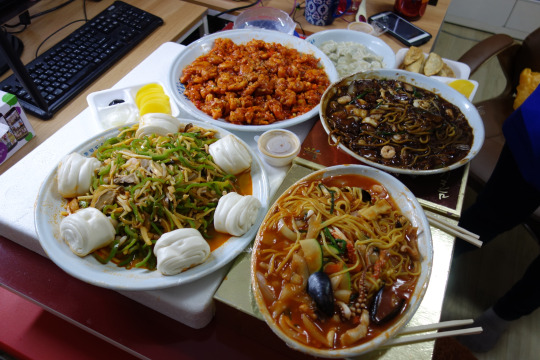Can you imagine getting paid to record yourself binge-eating? In South Korea, it’s been a reality for some people since 2011. This food craze is known as mukbang, or live-streaming people eating tremendous amounts of food.
It’s been a blooming phenomenon, successful enough for the “online eaters” to continue hosting mukbangs as a full-time job. These people, called “broadcast jockeys” (or BJs, for short), can earn up to $10,000 per month (depending on ranking and popularity) from donations from fans.
The role of a BJ entails more than just eating in front of thousands of strangers. They must perform the feasting in a viscerally, pleasurable way to the viewers as each BJ tries to distinguish him or herself among the estimated 3,000 mukbang BJs in South Korea.

Photo courtesy of tumblr.com
Some of the “passionate eating” entertainment that the viewers look for includes loud slurping of noodles and munching on dumplings. Upon such performances, the audience award mukbang BJs with virtual balloons that can be converted into cash.
Rachel Ahn, more commonly known as “Aebong-ee” in her broadcasts, is one of the most popular BJs in mukbang culture. Every weeknight at 9 pm, she prepares to feast on a meal big enough to feed a family of six in front of a camera and mic.
Her viewers, which average about to be at least 1,000 per broadcast, donated $200 to her within the first half-hour of her three-hour broadcast. They interact with her via a chatting box next to her video stream, offering her feedback and asking how spicy the noodles are, as well as suggesting she move dumplings closer to the camera or do a dance in excitement.
So what exactly motivates Koreans to pay and watch strangers to eat to their heart’s content persistently? The short documentary above reveals a few reasons. Some of the members of the female fanbase of the mukbang world are driven by their desire for vicarious gratification through BJs when they are on a diet.
AfreecaTV‘s digital media manager, Hahn Yeh Seul, suspects that people gain a sense of community by watching these broadcasts. In this fast-paced, work-driven society, a consistent, sit-down meal with the family is becoming harder to come by.
Perhaps we as humans long for that sense of connection as we engage in the natural and essential activity of eating.
On the other hand, Kyung Kim, professor of East Asian studies at University of California-Irvine, suggests the audience’s hunger for mukbang is associated with its desire for genuineness. In a culture overrun by celebrities with makeup and plastic surgery, people find that mukbang culture is new, fresh and genuine.
With this rising mukbang fad that emphasizes the viewing of food consumption over food production (like cooking shows), interpersonal relationships and views on culture are embarking on a dynamic turn in South Korea.

